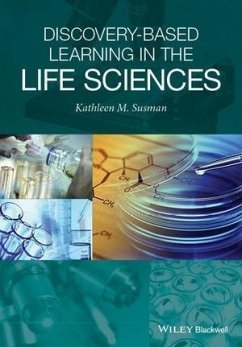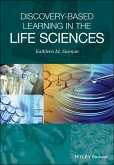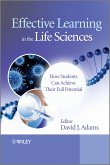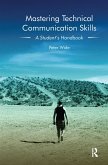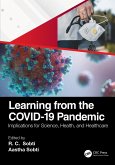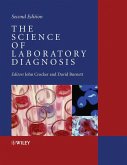Discovery-Based Learning in the Life Sciences (eBook, PDF)


Alle Infos zum eBook verschenken

Discovery-Based Learning in the Life Sciences (eBook, PDF)
- Format: PDF
- Merkliste
- Auf die Merkliste
- Bewerten Bewerten
- Teilen
- Produkt teilen
- Produkterinnerung
- Produkterinnerung

Hier können Sie sich einloggen

Bitte loggen Sie sich zunächst in Ihr Kundenkonto ein oder registrieren Sie sich bei bücher.de, um das eBook-Abo tolino select nutzen zu können.
For nearly a decade, scientists, educators and policy makers have issued a call to college biology professors to transform undergraduate life sciences education. As a gateway science for many undergraduate students, biology courses are crucial to addressing many of the challenges we face, such as climate change, sustainable food supply and fresh water and emerging public health issues. While canned laboratories and cook-book approaches to college science education do teach students to operate equipment, make accurate measurements and work well with numbers, they do not teach students how to…mehr
- Geräte: PC
- mit Kopierschutz
- eBook Hilfe
- Größe: 3.93MB
![Discovery-Based Learning in the Life Sciences (eBook, ePUB) Discovery-Based Learning in the Life Sciences (eBook, ePUB)]() Kathleen M. SusmanDiscovery-Based Learning in the Life Sciences (eBook, ePUB)47,99 €
Kathleen M. SusmanDiscovery-Based Learning in the Life Sciences (eBook, ePUB)47,99 €![Effective Learning in the Life Sciences (eBook, PDF) Effective Learning in the Life Sciences (eBook, PDF)]() Effective Learning in the Life Sciences (eBook, PDF)47,99 €
Effective Learning in the Life Sciences (eBook, PDF)47,99 €![Mastering Technical Communication Skills (eBook, PDF) Mastering Technical Communication Skills (eBook, PDF)]() Peter WideMastering Technical Communication Skills (eBook, PDF)31,95 €
Peter WideMastering Technical Communication Skills (eBook, PDF)31,95 €![Learning from the COVID-19 Pandemic (eBook, PDF) Learning from the COVID-19 Pandemic (eBook, PDF)]() Learning from the COVID-19 Pandemic (eBook, PDF)51,95 €
Learning from the COVID-19 Pandemic (eBook, PDF)51,95 €![Learning from the COVID-19 Pandemic (eBook, PDF) Learning from the COVID-19 Pandemic (eBook, PDF)]() Learning from the COVID-19 Pandemic (eBook, PDF)51,95 €
Learning from the COVID-19 Pandemic (eBook, PDF)51,95 €![The Science of Laboratory Diagnosis (eBook, PDF) The Science of Laboratory Diagnosis (eBook, PDF)]() The Science of Laboratory Diagnosis (eBook, PDF)258,99 €
The Science of Laboratory Diagnosis (eBook, PDF)258,99 €![The Limits of Reductionism in Biology (eBook, PDF) The Limits of Reductionism in Biology (eBook, PDF)]() The Limits of Reductionism in Biology (eBook, PDF)108,99 €
The Limits of Reductionism in Biology (eBook, PDF)108,99 €-
-
-
Dieser Download kann aus rechtlichen Gründen nur mit Rechnungsadresse in A, B, BG, CY, CZ, D, DK, EW, E, FIN, F, GR, HR, H, IRL, I, LT, L, LR, M, NL, PL, P, R, S, SLO, SK ausgeliefert werden.
- Produktdetails
- Verlag: John Wiley & Sons
- Seitenzahl: 184
- Erscheinungstermin: 29. Juni 2015
- Englisch
- ISBN-13: 9781118907573
- Artikelnr.: 43404456
- Verlag: John Wiley & Sons
- Seitenzahl: 184
- Erscheinungstermin: 29. Juni 2015
- Englisch
- ISBN-13: 9781118907573
- Artikelnr.: 43404456
- Herstellerkennzeichnung Die Herstellerinformationen sind derzeit nicht verfügbar.
1 The New Life Sciences 1
The Challenges We Face in Teaching the New Biology 2
Visions of Change 5
Need for Structural Change 6
Conceptual Organization of Introductory Biology 8
Learning and Mastering 10
Further Reading 13
2 Changing Goals and Outcomes in Introductory Life Science Course
Laboratories 15
The Introductory Science Course Experience That We Have 15
How Science is Actually Done 15
Challenges to Successful Science Teaching 18
Pre-College Preparation Disparities 18
Avoiding the Textbook as the Organizer of Your Course 18
Weaning Away from Content-Heavy Lectures 20
The Elements of Successful Science Learning 21
Student Autonomy 21
Relevance 21
Student Investment 21
Sustained Engagement 22
Understanding Through Teaching 23
Two Re-organizational Schemes for an Introductory Biology Course 23
Re-organizational Scheme 1: Putting the Classroom First 23
Re-organizational Scheme 2: Putting the Laboratory First 26
Example Topic: Biological Arms Races (Conceptual Areas:
Structure and Function, Information Storage and Transfer, Evolution,
Systems) 27
What Do These Scenarios have in Common? What is Going on? 28
Classroom Support for the Laboratory Work 29
Summary 30
Further Reading 31
3 Incorporating Discovery-Based Laboratory Experiences at the Introductory
Level 33
The Reality of Introductory Biology Laboratories 37
Converting the Survey Approach to Biology Techniques into Discovery-Based
Experiences that Emphasize Concepts 38
Module I: What are the Effects of Different Aspects of Climate Change or
Other Anthropogenic Changes on Plant Primary Productivity? 41
Weeks 1 and 2: Observing Plant Cells and Measuring Plant Primary
Productivity -Two Laboratory Weeks 42
Simple Assays of Photosynthesis/Primary Productivity 44
Week 3: Designing Independent Experiments to Explore the Effects of Climate
Change on Primary Productivity in Green Plants 46
Week 4 and 5: Student-designed Discovery-based Experiments and Data
Analysis 46
Week 6: Field Observations of Plant Communities in Areas Exposed to
Fertilizer Run-off or Other Human Activity such as Road Salt Application in
the Winter 47
Assessments 47
Module 2: How Does Antibiotic Resistance Develop? 48
Week 1: Observing cell division; Measuring bacterial Growth and
Introduction to Sterile Techniques 49
Week 2: Plate Assay or Turbidity Measurements to Examine Antibiotic
Resistance, Design of Selection Experiments 50
Weeks 3-5: Independent Experiments Examining Antibiotic Resistance 52
Week 6-7: Continued Experiments if Time Permits 54
Assessments 54
Module 3: Self-Discovery Explorations of Human Diseases Caused by Single
Nucleotide Polymorphisms 54
Week 1: Student Investigation Specific Aims and Goals -Use of
Bioinformatics to Explore Genetic Diseases Associated with SNPs 56
Weeks 2 and 3: SNP Analysis for TASR 38 or cdk3 Using Polymerase Chain
Reaction 58
Assessment Ideas 58
Summary 60
Further Reading 60
4 The Constraints and Realities of Discovery-Based Laboratories 63
Instructor Expertise 63
Time 65
Preparation Time 66
Student Time In and Out of the Laboratory 66
Time for Class and Laboratory -the Schedule of Classes 68
Time of Academic Year 69
The Physical Arrangement of the Teaching Laboratory 70
Class Size 71
Number of Laboratory Sections 72
Resources for Discovery-Based Laboratories 72
Organisms 73
Equipment 76
Safety Considerations for Independent Projects 76
Transportation for Field-Based Studies 76
Preparatory Staff 77
Student Interns/TAs 78
Summary 78
Further Reading 78
5 A Model Introductory Biology Course 81
Instructor Group Meetings 81
Shared Course Materials 82
Flexible Design Allows for the Introduction of New Modules 82
Overall Conceptual Organization 83
Laboratory Modules for the First Edition of "Introduction to Biological
Investigation" 84
Module 1: Caenorhabditis elegans: From Genes to Behavior 84
Module 2: Cyanogenic Clover: Genetic Variation and Natural Selection 89
Module 3: Biodiversity and Soil Microbial Ecology 93
Additional Laboratory Modules 95
Module 4: Personal Genomics: Understanding Individual Genetic Variation 96
Module 5: Behavioral Variations Within a Species 97
Assessment of Learning of Core Concepts and Skills 99
Student Evaluation of the Course 99
Faculty Concerns and Discomforts 100
Further Reading 101
6 Two Model Scenarios for an Intermediate-Level Life Science Course 103
Model 1: Exploration of Gerontogenes and Behavior 105
Assessment of Skills and Student Learning 107
Model 2: How do Common Lawn Chemicals Affect the Behavior and the Nervous
System of C. elegans? 107
Summary of the Format 110
Assessment of Student Learning 110
Goal 1: Achieve a Solid Foundation in the Experimental Approaches to a
Variety of Current Research Questions in Neuroscience and Behavior 111
Goal 2: Achieve a Sophisticated Ability to Read and Interpret the Primary
Experimental Literature 111
Goal 3: Formulate a Hypothesis, Design and Conduct a Multilevel
Experimental Project Over SeveralWeeks to Discover New Information About
the Relationship Between Genes and Behavior 111
Goal 4: Perform and Understand Appropriate Statistical Analysis of
Behavioral Data, Gain Confidence in the Use and Limitations of Model
Organisms, Computational and Bioinformatics Approaches to Examining Complex
Relationships Between Genes and Behavior 112
Goal 5: Become Facile in the "Language" of Neuroscience and Behavior, with
a Thorough Mastery of our Chosen Subtopics, asWell as a Keen Ability to
Speak and Write on the Discipline 112
Further Reading 113
7 Assessments and Why They Are Important 115
What is Assessment? 115
Student Learning Assessments 116
Course-Based Assessments 120
Example 1: Assessment of Discovery-Based Introductory Biology Course 122
Example 2: Assessment of a Redesigned Introductory Cell Biology Course
Using Pretesting and Post-Testing 124
Instructor Quality Assessments 126
Interpreting the Data 127
What to do with the Data? 128
Further Reading 129
8 Fully Incorporating Vision and Change 131
The Anthropocene and the Importance of Biology Literacy 131
Limited Resources Constrain the Discovery Laboratory for All 132
Alternative Approaches 133
Envisioning Introductory Biology for the Science-Literate Citizen 134
Introductory Life Sciences: The Discovery-Based Classroom 135
Organizing the Discovery-Based Classroom: An Introductory Life Science
Course for All Students 137
Unit One: Food and Energy 137
Unit Two: Climate Change and Other Human Impacts 140
Unit Three: Health and Disease 142
Summary of This Chapter 143
Combining Science Literacy Training with Science Career Training 144
Concluding Thoughts 145
Further Reading 146
Appendix A: Laboratory Instructions for Behavioral Experiments Using
Caenorhabditis elegans 149
Learning Goals and Expectations 150
Part 1: Initial Behavioral Observations ofWild-Type and MutantWorms 150
Workshop 1A: Mechanosensory Behavior Experiments and Statistical Analysis
150
Workshop 1B: Chemosensory Behavioral Experiment and Statistical Analysis
153
Appendix B: Instructions for Microscopy Workshop 157
Assignment forWorkshop 2 158
Procedure for Preparing Wet Mounts of C. elegans 158
Index 161
1 The New Life Sciences 1
The Challenges We Face in Teaching the New Biology 2
Visions of Change 5
Need for Structural Change 6
Conceptual Organization of Introductory Biology 8
Learning and Mastering 10
Further Reading 13
2 Changing Goals and Outcomes in Introductory Life Science Course
Laboratories 15
The Introductory Science Course Experience That We Have 15
How Science is Actually Done 15
Challenges to Successful Science Teaching 18
Pre-College Preparation Disparities 18
Avoiding the Textbook as the Organizer of Your Course 18
Weaning Away from Content-Heavy Lectures 20
The Elements of Successful Science Learning 21
Student Autonomy 21
Relevance 21
Student Investment 21
Sustained Engagement 22
Understanding Through Teaching 23
Two Re-organizational Schemes for an Introductory Biology Course 23
Re-organizational Scheme 1: Putting the Classroom First 23
Re-organizational Scheme 2: Putting the Laboratory First 26
Example Topic: Biological Arms Races (Conceptual Areas:
Structure and Function, Information Storage and Transfer, Evolution,
Systems) 27
What Do These Scenarios have in Common? What is Going on? 28
Classroom Support for the Laboratory Work 29
Summary 30
Further Reading 31
3 Incorporating Discovery-Based Laboratory Experiences at the Introductory
Level 33
The Reality of Introductory Biology Laboratories 37
Converting the Survey Approach to Biology Techniques into Discovery-Based
Experiences that Emphasize Concepts 38
Module I: What are the Effects of Different Aspects of Climate Change or
Other Anthropogenic Changes on Plant Primary Productivity? 41
Weeks 1 and 2: Observing Plant Cells and Measuring Plant Primary
Productivity -Two Laboratory Weeks 42
Simple Assays of Photosynthesis/Primary Productivity 44
Week 3: Designing Independent Experiments to Explore the Effects of Climate
Change on Primary Productivity in Green Plants 46
Week 4 and 5: Student-designed Discovery-based Experiments and Data
Analysis 46
Week 6: Field Observations of Plant Communities in Areas Exposed to
Fertilizer Run-off or Other Human Activity such as Road Salt Application in
the Winter 47
Assessments 47
Module 2: How Does Antibiotic Resistance Develop? 48
Week 1: Observing cell division; Measuring bacterial Growth and
Introduction to Sterile Techniques 49
Week 2: Plate Assay or Turbidity Measurements to Examine Antibiotic
Resistance, Design of Selection Experiments 50
Weeks 3-5: Independent Experiments Examining Antibiotic Resistance 52
Week 6-7: Continued Experiments if Time Permits 54
Assessments 54
Module 3: Self-Discovery Explorations of Human Diseases Caused by Single
Nucleotide Polymorphisms 54
Week 1: Student Investigation Specific Aims and Goals -Use of
Bioinformatics to Explore Genetic Diseases Associated with SNPs 56
Weeks 2 and 3: SNP Analysis for TASR 38 or cdk3 Using Polymerase Chain
Reaction 58
Assessment Ideas 58
Summary 60
Further Reading 60
4 The Constraints and Realities of Discovery-Based Laboratories 63
Instructor Expertise 63
Time 65
Preparation Time 66
Student Time In and Out of the Laboratory 66
Time for Class and Laboratory -the Schedule of Classes 68
Time of Academic Year 69
The Physical Arrangement of the Teaching Laboratory 70
Class Size 71
Number of Laboratory Sections 72
Resources for Discovery-Based Laboratories 72
Organisms 73
Equipment 76
Safety Considerations for Independent Projects 76
Transportation for Field-Based Studies 76
Preparatory Staff 77
Student Interns/TAs 78
Summary 78
Further Reading 78
5 A Model Introductory Biology Course 81
Instructor Group Meetings 81
Shared Course Materials 82
Flexible Design Allows for the Introduction of New Modules 82
Overall Conceptual Organization 83
Laboratory Modules for the First Edition of "Introduction to Biological
Investigation" 84
Module 1: Caenorhabditis elegans: From Genes to Behavior 84
Module 2: Cyanogenic Clover: Genetic Variation and Natural Selection 89
Module 3: Biodiversity and Soil Microbial Ecology 93
Additional Laboratory Modules 95
Module 4: Personal Genomics: Understanding Individual Genetic Variation 96
Module 5: Behavioral Variations Within a Species 97
Assessment of Learning of Core Concepts and Skills 99
Student Evaluation of the Course 99
Faculty Concerns and Discomforts 100
Further Reading 101
6 Two Model Scenarios for an Intermediate-Level Life Science Course 103
Model 1: Exploration of Gerontogenes and Behavior 105
Assessment of Skills and Student Learning 107
Model 2: How do Common Lawn Chemicals Affect the Behavior and the Nervous
System of C. elegans? 107
Summary of the Format 110
Assessment of Student Learning 110
Goal 1: Achieve a Solid Foundation in the Experimental Approaches to a
Variety of Current Research Questions in Neuroscience and Behavior 111
Goal 2: Achieve a Sophisticated Ability to Read and Interpret the Primary
Experimental Literature 111
Goal 3: Formulate a Hypothesis, Design and Conduct a Multilevel
Experimental Project Over SeveralWeeks to Discover New Information About
the Relationship Between Genes and Behavior 111
Goal 4: Perform and Understand Appropriate Statistical Analysis of
Behavioral Data, Gain Confidence in the Use and Limitations of Model
Organisms, Computational and Bioinformatics Approaches to Examining Complex
Relationships Between Genes and Behavior 112
Goal 5: Become Facile in the "Language" of Neuroscience and Behavior, with
a Thorough Mastery of our Chosen Subtopics, asWell as a Keen Ability to
Speak and Write on the Discipline 112
Further Reading 113
7 Assessments and Why They Are Important 115
What is Assessment? 115
Student Learning Assessments 116
Course-Based Assessments 120
Example 1: Assessment of Discovery-Based Introductory Biology Course 122
Example 2: Assessment of a Redesigned Introductory Cell Biology Course
Using Pretesting and Post-Testing 124
Instructor Quality Assessments 126
Interpreting the Data 127
What to do with the Data? 128
Further Reading 129
8 Fully Incorporating Vision and Change 131
The Anthropocene and the Importance of Biology Literacy 131
Limited Resources Constrain the Discovery Laboratory for All 132
Alternative Approaches 133
Envisioning Introductory Biology for the Science-Literate Citizen 134
Introductory Life Sciences: The Discovery-Based Classroom 135
Organizing the Discovery-Based Classroom: An Introductory Life Science
Course for All Students 137
Unit One: Food and Energy 137
Unit Two: Climate Change and Other Human Impacts 140
Unit Three: Health and Disease 142
Summary of This Chapter 143
Combining Science Literacy Training with Science Career Training 144
Concluding Thoughts 145
Further Reading 146
Appendix A: Laboratory Instructions for Behavioral Experiments Using
Caenorhabditis elegans 149
Learning Goals and Expectations 150
Part 1: Initial Behavioral Observations ofWild-Type and MutantWorms 150
Workshop 1A: Mechanosensory Behavior Experiments and Statistical Analysis
150
Workshop 1B: Chemosensory Behavioral Experiment and Statistical Analysis
153
Appendix B: Instructions for Microscopy Workshop 157
Assignment forWorkshop 2 158
Procedure for Preparing Wet Mounts of C. elegans 158
Index 161
